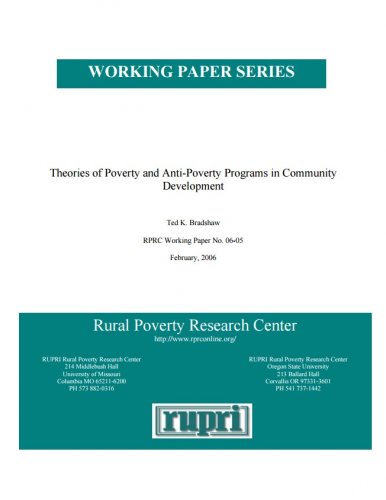This paper explores how five competing theories of poverty shape anti-poverty strategies. Since most rural community development efforts aim to relieve causes or symptoms of poverty, it makes a difference which theory of poverty is believed to be responsible for the problem being addressed. In this paper five theories of poverty are distilled from the literature. It will be shown that these theories of poverty place its origin from
- individual deficiencies,
- cultural belief systems that support subcultures in poverty,
- political-economic distortions,
- geographical disparities, or
- cumulative and circumstantial origins.
Then, the paper shows how each theory of poverty finds expression in common policy discussion and community development programs aimed to address the causes of poverty. Building a full understanding of each of these competing theories of poverty shows how they shape different community development approaches.
While no one theory explains all instances of poverty, this paper aims to show how community development practices that address the complex and overlapping sources of poverty more effectively reduce poverty compared to programs that address a single theory.
Download Theories of Poverty and Anti-Poverty Programs in Community Development
The thesis of this paper is that community anti-poverty programs are designed, selected, and implemented in response to different theories about the cause of poverty that “justify” the community development interventions. The definition of poverty and theories that explain it are deeply rooted in strongly held research traditions and political values, reinforced by encompassing social, political and economic institutions that have a stake in the issue. Thus, a purely objective explanation of poverty is displaced by a proliferation of socially defined issues and concerns from both liberal and conservative perspectives. Moreover, no one theory of poverty has emerged that either subsumes or invalidates the others. Explaining poverty remains a lucrative field for academics, policy makers, book publishers, and ideologues, and as a consequence the range of explanations has proliferated.
Table of Contents
Introduction
Poverty Definitions
Sources and approach
Five theories of Poverty in Contemporary Literature
1. Poverty Caused by Individual Deficiencies.
Anti-Poverty Programs from an Individual Theory of Poverty Perspective.
2. Poverty Caused by Cultural Belief Systems that Support Sub-Cultures of Poverty
Anti-Poverty programs from a Culture of Poverty Perspective.
3. Poverty Caused by Economic, Political, and Social Distortions or Discrimination
Anti-Poverty Programs from a Structure of Poverty Perspective.
4. Poverty Caused by Geographical Disparities
Anti-Poverty Programs from a Geography of Poverty Perspective.
5. Poverty Caused by Cumulative and Cyclical Interdependencies
Anti-Poverty programs from a Cycle of Poverty Perspective.
Implications
Source





